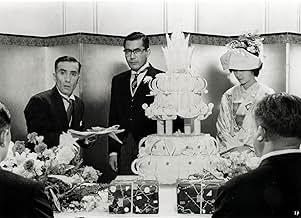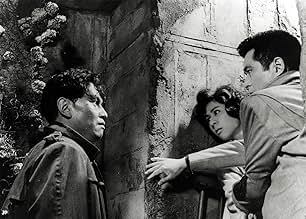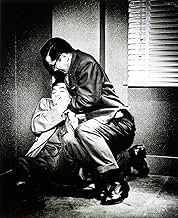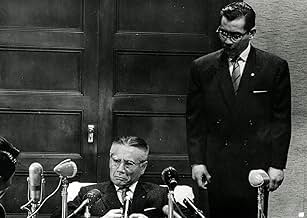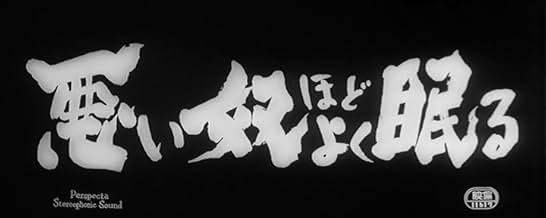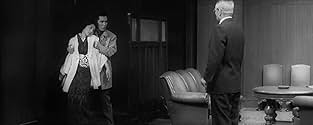IMDb RATING
8.0/10
15K
YOUR RATING
A vengeful young man marries the daughter of a corrupt industrialist in order to seek justice for his father's suicide.A vengeful young man marries the daughter of a corrupt industrialist in order to seek justice for his father's suicide.A vengeful young man marries the daughter of a corrupt industrialist in order to seek justice for his father's suicide.
- Awards
- 3 wins & 1 nomination total
Featured reviews
I just watched "The Bad Sleep Well," and finished reading the other viewers comments. So I will comment on both. "Seven Samurai" is perhaps my favorite film of all time, and I really like Kurasawa's work. Other than the brief plot summary, I didn't really know what to expect from "The Bad Sleep Well." The beginning can be somewhat confusing, as the reporters throw out lots of Japanese names and the viewer must struggle to understand what's going on and who is who. But as the film progressed, I found myself drawn in and completely absorbed by it. Don't worry if you don't get it at first, all will become clear. I found this to be an excellent film, and I would recommend it to any Kurasawa film. Sure, it's not action-packed like his samurai films. And yes, it is somewhat slow in pace. But I must say that I didn't really mind that. I found it quite engrossing. There are enough plot twists and turns to keep the viewer interested. I din't think that Toshiro Mifune did a bad job either, as some other viewers thought. He's not wild and crazy like in "Seven Samurai" or "Rashomon" but I didn't think he was badly cast. Sadly, I am not intimately familiar with "Hamlet," so I can't comment too much on the similarities. It seems to be the general opinion that this "The Bad Sleep Well" is loosely based on Hamlet, but I also agree that this won't detract from your enjoyment of the film in any way, and that knowing "Hamlet" doesn't mean that you will know what happens in this film. I agree with those who say that this is another underrated Kurarsawa masterpiece, and well worth seeing. Give it a chance!
"The Bad Sleep Well" is Akira Kurosawa's second handling of the film noir genre after "Stray Dog" in 1949 and three years before "High and Low" in 1963. These two films were gripping documentary-like police procedurals. In contrast, "The Bad Sleep Well", with its intriguing title and loosely Hamletian undertones, shows the way these procedurals can be made useless by the sheer power of bureaucratic Omerta... and I'm not using the word in vain.
The film is perhaps the most noirish of the three in its vitriolic depiction of corporate corruption, showing us the other side of modern Japan's coin where hierarchy governs not most but all of its institutions, family included. In fact, what the film accomplishes through the precise and uncompromising eye of Kurosawa's camera and a tight (if not somewhat tedious) script, reminds me of a classic among the classics: "The Godfather" and Coppola must have loved "The Bad Sleep Well".
The film is about a bunch of corporate executives in the Construction and Land Development business using their influence, wealth and occasionally disguised threats to hide a kickback scheme that occurred seven years ago. There's the Vice President Iwabushi, the Administrative Officer Moriyama, the Assistant-to-the-Chief Wada, the Contract Officer Shirai, each man representing a stratus protecting the upper layer from collapsing the higher you are, the safer you get, which plays exactly like the Mafia vertical organization with soldiers and "buffers" ... some execute and some are executed. The bad indeed sleep well.
"Ikiru", which is certainly Kurosawa's most acclaimed modern movie, hid behind its existential message an assertive comment against public bureaucracy. "The Bad Sleep Well" goes even further by subverting the clichés about Japanese's discipline with some employees going as far as sacrificing their lives. There's a moment where the accountant receives a message that says grossly "we'll take care of you, everything will be all right", and then he ultimately throws himself under a passing bus.
It's not often that you have two "Godfather" references in one, the message reminded me of the last talk between Tom Hagen and Frank Pentangeli in "Part II" and the sound of the truck coming with the close-up on the ma n's" face echoed the climax of the restaurant scene. And if the "Godfather" trilogy was about gangsters posing as respectable men, "The Bad Sleep Well" is about respectable men acting like gangsters. And I'm not done with the comparisons, the most notable one is the opening sequence with a wedding that makes the exposition elements flow without feeling too forced.
Snarky reporters are covering the wedding between the daughter of Iwabushi, played by Masayuki Mori (I couldn't believe it was 9 years after his youthful appearance in "The Idiot") and Nishi, a quiet and discreet secretary played by Toshiro Mifune. The girl has a lump and rumor has it that Nishi married her out of interests (they're half right actually). And so the wedding allows us to place names in face and a few incidents set up the action: an untimely arrest, Ibawushi's son Tatsuo (Tatsuya Mihashi) makes a speech where he threatens to kill Nishi if he ruins his sister's life but the icing of a cake is the wedding cake itself. In place of the real one, a cake representing the company's building is served, a rose placed in the seventh floor from which an employee jumped to his death, ending an investigation for corruption. "This marks the end of a one-act play," says a reporter "are you kidding?", retorts his colleague, "this is only a prologue".
And so the prologue ends and the action takes off through a series of incidents suggesting that there's a mole in the company who know about the events that occurred seven year ago, who ordered the cake to send a message and who's up to something. The film features one of the most elaborate schemes, a strategy of destruction whose many tactics include the disguise of Wada's disappearance into suicide. In a later scene, the man is allowed to assist his own funeral and hear his employees gloating at his death. Shirai is then gaslighted to the point that you almost feel sorry for him. Finally, Moyamari (Takashi Shimura) is forced to reveal where the dirty money by simply being starved. I had often wondered why no one thought of extorting money with a simple glass of water, glad a film thought of it.
Of course, it doesn't take long to reveal the perpetrator of all these actions, but more importantly his motive. It's obviously Nishi, the central protagonist, and it's easy to make the parallel with the seventh floor's death and his thirst for revenge but the best thing about the film is how conflicted Nishi is. He has obviously married the daughter to approach a man who is his enemy and with time, his sentiments grow. Moreover, even Wada starts to empathize with his actions and advise him against not becoming like the men he fight. The problem of Nishi is that his actions destroy the father of a person he cares for and ironically turns him into a character who, if not morally bad, uses the same tools than his enemies. It doesn't make him worse but his own morality is put in the film's equation.
Nishi's playful whistling is the film's musical leitmotif, suggesting that he's "enjoying" what he does to a limit. We do "enjoy" the way he toys with these serious men's sanity and sense of immunity and the film while two hours and half long, finds a way to draw us in Nishi's action. But the game stops near the third act, when his intentions are revealed, and the enemies fight back.
Now, I'm still puzzled by the ending, to the point I wondered whether it's the best or the worst thing about the film. One thing for sure, when it ended with that head being bowed and the title appeared, I was nodding mine.
The film is perhaps the most noirish of the three in its vitriolic depiction of corporate corruption, showing us the other side of modern Japan's coin where hierarchy governs not most but all of its institutions, family included. In fact, what the film accomplishes through the precise and uncompromising eye of Kurosawa's camera and a tight (if not somewhat tedious) script, reminds me of a classic among the classics: "The Godfather" and Coppola must have loved "The Bad Sleep Well".
The film is about a bunch of corporate executives in the Construction and Land Development business using their influence, wealth and occasionally disguised threats to hide a kickback scheme that occurred seven years ago. There's the Vice President Iwabushi, the Administrative Officer Moriyama, the Assistant-to-the-Chief Wada, the Contract Officer Shirai, each man representing a stratus protecting the upper layer from collapsing the higher you are, the safer you get, which plays exactly like the Mafia vertical organization with soldiers and "buffers" ... some execute and some are executed. The bad indeed sleep well.
"Ikiru", which is certainly Kurosawa's most acclaimed modern movie, hid behind its existential message an assertive comment against public bureaucracy. "The Bad Sleep Well" goes even further by subverting the clichés about Japanese's discipline with some employees going as far as sacrificing their lives. There's a moment where the accountant receives a message that says grossly "we'll take care of you, everything will be all right", and then he ultimately throws himself under a passing bus.
It's not often that you have two "Godfather" references in one, the message reminded me of the last talk between Tom Hagen and Frank Pentangeli in "Part II" and the sound of the truck coming with the close-up on the ma n's" face echoed the climax of the restaurant scene. And if the "Godfather" trilogy was about gangsters posing as respectable men, "The Bad Sleep Well" is about respectable men acting like gangsters. And I'm not done with the comparisons, the most notable one is the opening sequence with a wedding that makes the exposition elements flow without feeling too forced.
Snarky reporters are covering the wedding between the daughter of Iwabushi, played by Masayuki Mori (I couldn't believe it was 9 years after his youthful appearance in "The Idiot") and Nishi, a quiet and discreet secretary played by Toshiro Mifune. The girl has a lump and rumor has it that Nishi married her out of interests (they're half right actually). And so the wedding allows us to place names in face and a few incidents set up the action: an untimely arrest, Ibawushi's son Tatsuo (Tatsuya Mihashi) makes a speech where he threatens to kill Nishi if he ruins his sister's life but the icing of a cake is the wedding cake itself. In place of the real one, a cake representing the company's building is served, a rose placed in the seventh floor from which an employee jumped to his death, ending an investigation for corruption. "This marks the end of a one-act play," says a reporter "are you kidding?", retorts his colleague, "this is only a prologue".
And so the prologue ends and the action takes off through a series of incidents suggesting that there's a mole in the company who know about the events that occurred seven year ago, who ordered the cake to send a message and who's up to something. The film features one of the most elaborate schemes, a strategy of destruction whose many tactics include the disguise of Wada's disappearance into suicide. In a later scene, the man is allowed to assist his own funeral and hear his employees gloating at his death. Shirai is then gaslighted to the point that you almost feel sorry for him. Finally, Moyamari (Takashi Shimura) is forced to reveal where the dirty money by simply being starved. I had often wondered why no one thought of extorting money with a simple glass of water, glad a film thought of it.
Of course, it doesn't take long to reveal the perpetrator of all these actions, but more importantly his motive. It's obviously Nishi, the central protagonist, and it's easy to make the parallel with the seventh floor's death and his thirst for revenge but the best thing about the film is how conflicted Nishi is. He has obviously married the daughter to approach a man who is his enemy and with time, his sentiments grow. Moreover, even Wada starts to empathize with his actions and advise him against not becoming like the men he fight. The problem of Nishi is that his actions destroy the father of a person he cares for and ironically turns him into a character who, if not morally bad, uses the same tools than his enemies. It doesn't make him worse but his own morality is put in the film's equation.
Nishi's playful whistling is the film's musical leitmotif, suggesting that he's "enjoying" what he does to a limit. We do "enjoy" the way he toys with these serious men's sanity and sense of immunity and the film while two hours and half long, finds a way to draw us in Nishi's action. But the game stops near the third act, when his intentions are revealed, and the enemies fight back.
Now, I'm still puzzled by the ending, to the point I wondered whether it's the best or the worst thing about the film. One thing for sure, when it ended with that head being bowed and the title appeared, I was nodding mine.
10maurazos
I am watching Kurosawa's full collection and the more I watch, the more I love the art of "The Emperor". And unlike many Kurosawa's fans, my preferred films are those that talk about the time Kurosawa lived, not about the samurai ages. Again, Kurosawa uses the literature classics (for this film, Shakespeare's "Hamlet") as a source for his stories, proving that the subjects they talked about are still modern. Anyway, the genius of Kurosawa is quite big to make their film be not just a cinema remake of those texts, but an original, exciting plot. And again, Kurosawa gives us a film with a clear and worrying social message, a denounce to a serious problem (company and state corruption that even today still darkens the image of a "100% legal" Japan). A film to enjoy and film to learn about Japanese society and life in a general way.
At the start of this film I didn't know what to expect. I thought it might be a mediocre Kurosawa film. By the end of the film I realized it was one of his best. This film about familial discord and corporate manipulation is breathtaking. Its filled with irony, double crosses, cynicism, manipulation and revenge. In short, its endlessly interesting and captivating. Definitly a must see.
Akira Kurosawa's "The Bad Sleep Well" is too dense and frankly too slow a film to qualify as a thriller in the usual sense. Although the elements are there - intrigue, double crosses, revenge, and crimes both naked and invisible - the pacing is too deliberate and there is little real suspense.
Yes, it's "Hamlet," though in a subtle, understated, Japanese way. Some of the characters are left out, but you'll eventually spot the Prince, Horatio, Ophelia, and Claudius. However, unlike his "Macbeth" ("Throne of Blood"), this is only a partial transposition and Kurosawa wisely does not carry the parallels too far.
Although it takes patience, the picture has its rewards. The performances are good, especially Masayuki Mori as the reptilian manipulator Iwabuchi, Kamatari Fujiwara as the hapless accountant Wada, and, as always, Takashi Shimura as master bureaucrat Moriyama. The sharp black-and-white cinematography gives the film a photo-journal aura of authenticity. And Masaru Sato's wonderful opening theme, heavy with menace and unease, certainly sets an appropriate tone.
Toshiro Mifune as Nishi/Hamlet is unusually restrained here, his normal fire largely internalized. He's adequate, but this casting against type doesn't really suit him.
"The Bad Sleep Well" is Kurosawa's attack on Japan's post-war business corruption that apparently was endemic by 1960 and perhaps still is today. His critique is harsh and unsparing, though one can't help but get the feeling that he's shooting at fish in a barrel.
Beyond the corruption of the corporate scandal, which the film literally headlines, is a strong sense of inner decay. Nearly everyone, regardless of their position, is uncomfortable. Even Iwabuchi, for all his power, must answer awkwardly to greater, unseen forces. Only the jackal-journalists who cover the opening wedding banquet seem immune to the pervasive uneasiness.
Yet all, save Nishi, are prepared to accept this state of affairs in return for their security. Ironically, Nishi himself seems most comfortable in an old air raid shelter in the ruins of a munitions plant, his own "castle", as it were, where he fights for honor as he understands it.
Recommended for Kurosawa fans and anyone interested in Japanese psyche, culture, or style. Those expecting a slam-bang 1940s Warner Brothers treatment will be extremely disappointed and probably won't last an hour.
Yes, it's "Hamlet," though in a subtle, understated, Japanese way. Some of the characters are left out, but you'll eventually spot the Prince, Horatio, Ophelia, and Claudius. However, unlike his "Macbeth" ("Throne of Blood"), this is only a partial transposition and Kurosawa wisely does not carry the parallels too far.
Although it takes patience, the picture has its rewards. The performances are good, especially Masayuki Mori as the reptilian manipulator Iwabuchi, Kamatari Fujiwara as the hapless accountant Wada, and, as always, Takashi Shimura as master bureaucrat Moriyama. The sharp black-and-white cinematography gives the film a photo-journal aura of authenticity. And Masaru Sato's wonderful opening theme, heavy with menace and unease, certainly sets an appropriate tone.
Toshiro Mifune as Nishi/Hamlet is unusually restrained here, his normal fire largely internalized. He's adequate, but this casting against type doesn't really suit him.
"The Bad Sleep Well" is Kurosawa's attack on Japan's post-war business corruption that apparently was endemic by 1960 and perhaps still is today. His critique is harsh and unsparing, though one can't help but get the feeling that he's shooting at fish in a barrel.
Beyond the corruption of the corporate scandal, which the film literally headlines, is a strong sense of inner decay. Nearly everyone, regardless of their position, is uncomfortable. Even Iwabuchi, for all his power, must answer awkwardly to greater, unseen forces. Only the jackal-journalists who cover the opening wedding banquet seem immune to the pervasive uneasiness.
Yet all, save Nishi, are prepared to accept this state of affairs in return for their security. Ironically, Nishi himself seems most comfortable in an old air raid shelter in the ruins of a munitions plant, his own "castle", as it were, where he fights for honor as he understands it.
Recommended for Kurosawa fans and anyone interested in Japanese psyche, culture, or style. Those expecting a slam-bang 1940s Warner Brothers treatment will be extremely disappointed and probably won't last an hour.
Did you know
- TriviaThe ideas for the film came from Akira Kurosawa's nephew, Mike Y. Inoue, who wanted to be a scriptwriter and was giving his scripts to his uncle. Kurosawa liked it and made suggestions, to which Inoue spent six months rewriting the script under the title "Bad Men's Prosperity." Kurosawa, along with several others, reworked it even more into the final version, though Inoue did not receive screen credit.
- GoofsWhen Nishi is trying to push Shirai out of the window, the brick wall outside of the window moves around - a lot.
- Quotes
Koichi Nishi: It's not easy hating evil. You have to stoke your own fury until you become evil yourself.
- Alternate versionsOriginally released at 151 in Japan; USA version removes 16 minutes of footage.
- SoundtracksBridal Chorus
(uncredited)
from "Lohengrin"
Music by Richard Wagner
Played at the end of the wedding ceremony
- How long is The Bad Sleep Well?Powered by Alexa
Details
- Release date
- Country of origin
- Language
- Also known as
- Les salauds se portent bien
- Filming locations
- Aso Kuju National Park, Kyushu, Japan(volcanic area)
- Production companies
- See more company credits at IMDbPro
Box office
- Budget
- ¥82,540,000 (estimated)
- Gross US & Canada
- $46,808
- Opening weekend US & Canada
- $15,942
- Jul 28, 2002
- Gross worldwide
- $47,023
- Runtime
- 2h 31m(151 min)
- Color
- Aspect ratio
- 2.35 : 1
Contribute to this page
Suggest an edit or add missing content


